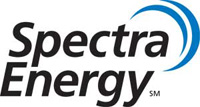Enbridge Inc. is a Canadian multinational pipeline and energy company headquartered in Calgary, Alberta, Canada. Enbridge owns and operates pipelines throughout Canada and the United States, transporting crude oil, natural gas, and natural gas liquids, and also generates renewable energy. Enbridge's pipeline system is the longest in North America and the largest oil export pipeline network in the world. Its crude oil system consists of 28,661 kilometres of pipelines. Its 38,300 kilometre natural gas pipeline system connects multiple Canadian provinces, several US states, and the Gulf of Mexico. The company was formed by Imperial Oil in 1949 as the Interprovincial Pipe Line Company Limited to transport Alberta oil to refineries. Over time, it has grown through acquisition of other existing pipeline companies and the expansion of their projects.
Union Gas was a major Canadian natural gas company based in Ontario. Its distribution arm serviced approximately 1.5 million customers in northern, southwestern and eastern Ontario. Union Gas has been a subsidiary of Enbridge since February 2017, when former parent Spectra Energy merged into Enbridge.
The Algonquin Gas Transmission Pipeline is a 1,100 miles (1,800 km) long pipeline system, which delivers natural gas to New England. It is connected to the Texas Eastern Pipeline and the Maritimes & Northeast Pipeline. The Algonquin Gas Transmission pipelines transport about 20 billion cubic meters (bcm) of natural gas per annum. It generally receives gas that originated in the Gulf of Mexico, although it also receives gas from an LNG terminal in Massachusetts. The Algonquin Gas Transmission is owned by Enbridge. The pipeline's compressor station in Weymouth, Massachusetts was the subject of numerous protests before it was permitted, including 211 days of sit-ins over three years in the Governor's office. It has had multiple unplanned gas releases since it opened in January 2021, and a state adjudicator recommended reevaluating its permit in 2022.
East Tennessee Natural Gas Pipeline is a natural gas pipeline that brings gas from eastern Tennessee to Virginia and North Carolina. It was formerly owned by Duke Energy but is now owned by Enbridge. Its FERC code is 2.
Gulfstream Natural Gas Pipeline is a natural gas pipeline that brings gas from Mississippi and Alabama, underwater across the Gulf of Mexico, to Florida. It was owned by Duke Energy, but is now owned by Enbridge and Williams. Its FERC code is 183.
Texas Eastern Pipeline (TETCo) is a major natural gas pipeline which brings gas from the Gulf of Mexico coast in Texas and Louisiana up through Mississippi, Arkansas, Tennessee, Missouri, Kentucky, Illinois, Indiana, Ohio, and Pennsylvania to deliver gas in the New York City area. It is one of the largest pipeline systems in the United States. It is owned by Enbridge. Its FERC code is 17.
Vector Pipeline L.P. is a 348-mile-long natural gas pipeline which transports approximately 1 billion cubic feet (28,000,000 m3) per day of natural gas from Joliet, Illinois, in the Chicago area, to parts of Indiana and Michigan and into Ontario, Canada. The pipeline is important in the supply and transportation of natural gas from the United States and Western Canada to the Midwest, eastern Canada and the northeastern United States, supplying power generation plants, natural gas distribution companies, and natural gas storage facilities. The pipeline also has interconnections with several other natural gas pipelines along its route.

Petroleum production in Canada is a major industry which is important to the overall economy of North America. Canada has the third largest oil reserves in the world and is the world's fourth largest oil producer and fourth largest oil exporter. In 2019 it produced an average of 750,000 cubic metres per day (4.7 Mbbl/d) of crude oil and equivalent. Of that amount, 64% was upgraded from unconventional oil sands, and the remainder light crude oil, heavy crude oil and natural-gas condensate. Most of the Canadian petroleum production is exported, approximately 600,000 cubic metres per day (3.8 Mbbl/d) in 2019, with 98% of the exports going to the United States. Canada is by far the largest single source of oil imports to the United States, providing 43% of US crude oil imports in 2015.
The Maritimes and Northeast Pipeline is a natural gas transmission pipeline that runs from the Sable Offshore Energy Project (SOEP) gas plant in Goldboro, Nova Scotia, Canada to Dracut, Massachusetts, United States.

The Canadian petroleum industry arose in parallel with that of the United States. Because of Canada's unique geography, geology, resources and patterns of settlement, however, it developed in different ways. The evolution of the petroleum sector has been a key factor in the history of Canada, and helps illustrate how the country became quite distinct from her neighbour to the south.
FortisBC is a Canadian owned, British Columbia based regulated utility providing natural gas, and electricity. FortisBC has approximately 2,600 employees serving more than 1.2 million customers in 135 B.C. communities and 58 First Nations communities across 150 Traditional Territories.

Spectra Energy Corp, headquartered in Houston, Texas, operated in three key areas of the natural gas industry: transmission and storage, distribution, and gathering and processing. Spectra was formed in late 2006 from the spin-off from Duke Energy. Spectra owned the Texas Eastern Pipeline (TETCo), a major natural gas pipeline which brings gas from the Gulf of Mexico coast in Texas to the New York City area, which was one of the largest pipeline systems in the United States. Spectra also operated three oil pipelines. In February 2017, Spectra Energy merged into the Canadian company Enbridge.

Francis Murray Patrick McMahon was a Canadian oilman best known as the founder of Pacific Petroleums and the Westcoast Transmission Company. Time magazine called him "The man who did the most to open up northwest Canada's wilderness—and convince oilmen of its treasures."

The Westcoast Transmission Company Limited was a Canadian pipeline company founded in 1949 by entrepreneur Frank McMahon who saw an enormous opportunity to supply natural gas to the huge industrial and residential markets in the United States.



